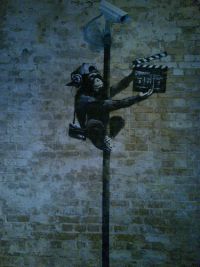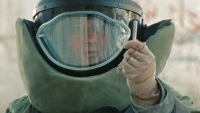I watched Inception last night (loved it as expected; knew it was going to be my kind of movie ever since I heard about it in October of ’09 from its director of ski photography) and hit the pillow thinking about why it had worked as a film. It’s significant that I went to sleep to ponder a movie about planting waking-life ideas in people’s dreams.
Yeah, the movie sucked me in. I gladly suspended my disbelief, rode along with the filmmakers’ playful illusions and deceits, and kept chewing on them after it was done. Suspension of disbelief is one pinnacle of moviemaking and Inception achieved it for me through visual storytelling rather than clever wordsmithing. To convey how dream travel worked, there was no narration, not much dialogue, and only enough pseudo-science and vague technique to serve as what Hitchcock called a McGuffin: a plot device that is really only in there to drive the characters nuts. Which is of course what audiences love.

Film so often works when it’s not about words but about the spaces between them. So why am I sixteen years deep working in film, thirty-some years a fan of moving pictures? Why of all media does it intrigue me— the writer— so much? Because it’s not about what words mean. It’s about what they do.
I woke this morning realizing that this may be my connection to the athletes in our film, The Movement. Why am I directing a film about disabled skiers? What’s my connection to five people who don’t walk through the world exactly the way I do? I think it’s because they chose to ski, when society and even their own minds told them that was ridiculous. I suppose I, too, take “that’s ridiculous” as an invitation. I’m a writer who understands that words ultimately mean nothing. And here I am still writing.
Words mean nothing? I’ll throw another writer’s meaningless words at the topic:
“I knew I should be a writer because it was something at which I would never be good enough.” — Some author, in an intro to his or her book. I think. Paraphrased here from memory. I haven’t been able to locate it again. See? Meaningless
It’s really only satisfying when the things we create see the light of day (or the glow of your monitor) and actually make something happen.
Think about all the hard work that goes into putting important things into just the right words— only to have that contract reneged upon, that screenplay mothballed, that novel pushed out of print. It’s not about what those words (or even those great huge conglomerations of words) mean, it’s about what they do while they are still alive.
Kind of like us humans, right?
Thanks for reading. Cheers,
![]()
Photos © Chris Patterson, used here with permission. Read more about Chris’ contribution to Inception in American Cinematographer, July 2010
 It’s only
It’s only  What if there was a little bit of right in every thoughtful, caring person the world ever knew? What if very, very few people (if any) were utterly worthless and the rest of us had something to contribute? Then it would be a matter of each of us, in our own way, figuring out what that contribution was, then honing it.
What if there was a little bit of right in every thoughtful, caring person the world ever knew? What if very, very few people (if any) were utterly worthless and the rest of us had something to contribute? Then it would be a matter of each of us, in our own way, figuring out what that contribution was, then honing it.